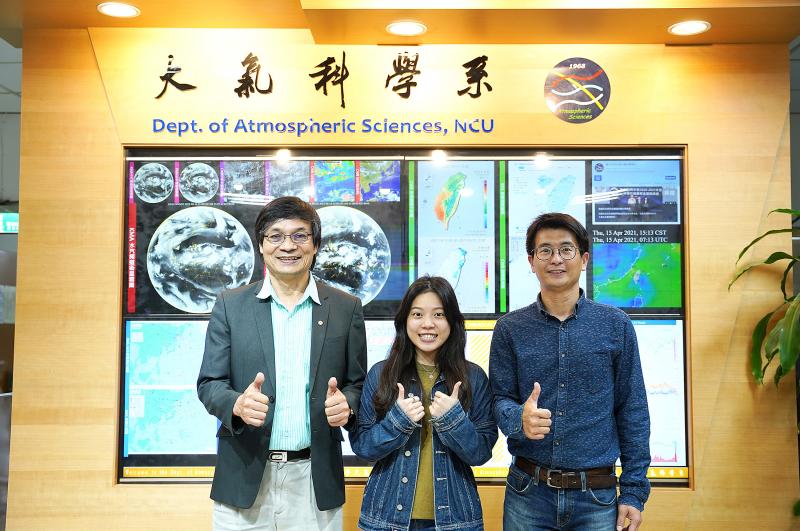New research suggests that air pollution indirectly reduces the amount of rainfall in northern Taiwan during autumn, which might have exacerbated the water shortage at New Taipei City’s Shihmen Reservoir (石門水庫).
Researchers from National Central University (NCU) and the State University of New York at Albany analyzed 13 years of satellite and surface data for the study, which was published on March 23 in the journal Atmospheric Chemistry and Physics.
Taiwan receives most of its annual rainfall from May to September during the plum rain and typhoon seasons, NCU Department of Atmospheric Sciences associate professor Wang Sheng-hsiang (王聖翔) said.

Photo courtesy of National Central University
Although there is relatively less rainfall during fall and winter, it is key to maintaining reservoir levels, Wang said.
However, it is also when pollution tends to be most severe, which not only affects health, but can also affect the characteristics of rain droplets, he added.
Researchers analyzed data from 2005 to 2017 on concentrations of PM2.5 — airborne particulate matter smaller than 2.5 micrometers — meteorological parameters, such as wind direction and temperature, raindrop size, aerosols and cloud properties, to determine the effect that aerosols might have on clouds and drizzle during autumn over northern Taiwan.
They found that in the densely industrialized northwest, the season is mainly dominated by warm, thin and broken clouds, which are defined as having an internal temperature of at least 0°C.
Aerosols were discovered to have an indirect effect on the clouds, meaning that as aerosol concentrations rose, cloud droplets became smaller and more numerous, with drizzles occurring less frequently.
The data also reflected this, as “polluted” days saw about 6.8mm less daily average rainfall than “clean” days, with polluted days defined as the 80th percentile of daily average PM2.5, while clean days fell in the 20th percentile.
Lead author of the study, Chen Ying-chieh (陳映潔), obtained a graduate degree from NCU’s Department of Atmospheric Sciences.
As a graduate student, she was in the first cohort of the US-Taiwan Partnership for International Research and Education (PIRE), which sent her on a two-month exchange to the US.
PIRE is run by the Ministry of Science and Technology and the US National Science Foundation through NCU and the State University of New York at Albany. The program aims to promote research collaboration on weather and climate prediction, and emergency response strategies.

ENDEAVOR MANTA: The ship is programmed to automatically return to its designated home port and would self-destruct if seized by another party The Endeavor Manta, Taiwan’s first military-specification uncrewed surface vehicle (USV) tailor-made to operate in the Taiwan Strait in a bid to bolster the nation’s asymmetric combat capabilities made its first appearance at Kaohsiung’s Singda Harbor yesterday. Taking inspiration from Ukraine’s navy, which is using USVs to force Russia’s Black Sea fleet to take shelter within its own ports, CSBC Taiwan (台灣國際造船) established a research and development unit on USVs last year, CSBC chairman Huang Cheng-hung (黃正弘) said. With the exception of the satellite guidance system and the outboard motors — which were purchased from foreign companies that were not affiliated with Chinese-funded

PERMIT REVOKED: The influencer at a news conference said the National Immigration Agency was infringing on human rights and persecuting Chinese spouses Chinese influencer “Yaya in Taiwan” (亞亞在台灣) yesterday evening voluntarily left Taiwan, despite saying yesterday morning that she had “no intention” of leaving after her residence permit was revoked over her comments on Taiwan being “unified” with China by military force. The Ministry of the Interior yesterday had said that it could forcibly deport the influencer at midnight, but was considering taking a more flexible approach and beginning procedures this morning. The influencer, whose given name is Liu Zhenya (劉振亞), departed on a 8:45pm flight from Taipei International Airport (Songshan airport) to Fuzhou, China. Liu held a news conference at the airport at 7pm,

Taiwan was ranked the fourth-safest country in the world with a score of 82.9, trailing only Andorra, the United Arab Emirates and Qatar in Numbeo’s Safety Index by Country report. Taiwan’s score improved by 0.1 points compared with last year’s mid-year report, which had Taiwan fourth with a score of 82.8. However, both scores were lower than in last year’s first review, when Taiwan scored 83.3, and are a long way from when Taiwan was named the second-safest country in the world in 2021, scoring 84.8. Taiwan ranked higher than Singapore in ninth with a score of 77.4 and Japan in 10th with

GRIDLOCK: The National Fire Agency’s Special Search and Rescue team is on standby to travel to the countries to help out with the rescue effort A powerful earthquake rocked Myanmar and neighboring Thailand yesterday, killing at least three people in Bangkok and burying dozens when a high-rise building under construction collapsed. Footage shared on social media from Myanmar’s second-largest city showed widespread destruction, raising fears that many were trapped under the rubble or killed. The magnitude 7.7 earthquake, with an epicenter near Mandalay in Myanmar, struck at midday and was followed by a strong magnitude 6.4 aftershock. The extent of death, injury and destruction — especially in Myanmar, which is embroiled in a civil war and where information is tightly controlled at the best of times —